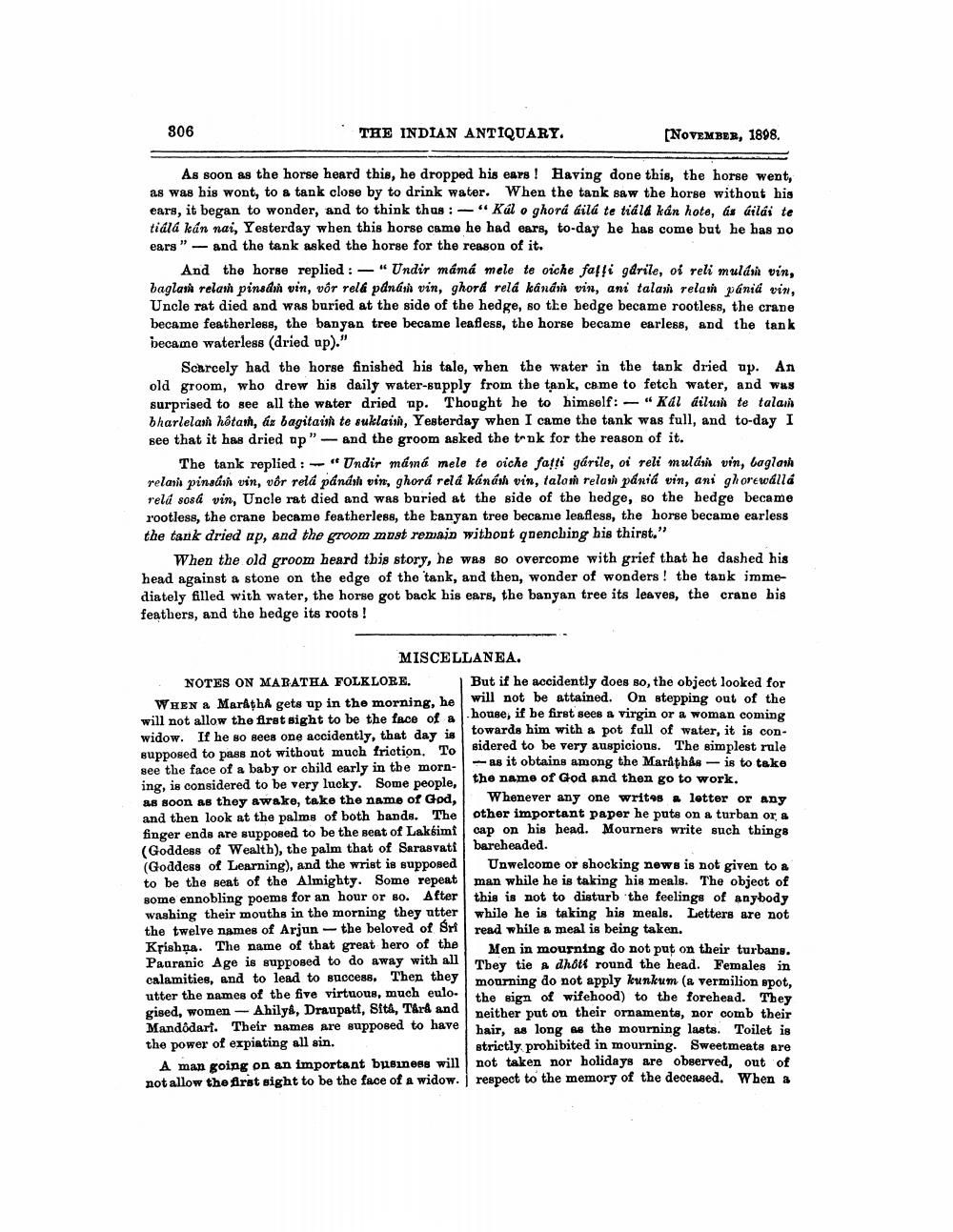________________
THE INDIAN ANTIQUARY.
[NOVEMBER, 1898.
As soon as the horse heard this, he dropped his ears! Having done this, the horse went, as was his wont, to a tank close by to drink water. When the tank saw the horse without his ears, it began to wonder, and to think thus: :-"Kál o ghorá áilá te tiálá kán hote, ás áilái te tiálá kán nai, Yesterday when this horse came he had ears, to-day he has come but he has no ears" and the tank asked the horse for the reason of it.
806
And the horse replied: "Undir mámá mele te oiche falli gdrile, oi reli mulám vin, baglam relam pinsdṁ vin, vôr relá pánám vin, ghorá relá kânám vin, ani talam relam pánia vin, Uncle rat died and was buried at the side of the hedge, so the hedge became rootless, the crane became featherless, the banyan tree became leafless, the horse became earless, and the tank became waterless (dried up)."
Scarcely had the horse finished his tale, when the water in the tank dried up. An old groom, who drew his daily water-supply from the tank, came to fetch water, and was surprised to see all the water dried up. Thought he to himself: "Kal dilum te talam bharlelam hotam, az bagitais te suklaim, Yesterday when I came the tank was full, and to-day I see that it has dried up" and the groom asked the tank for the reason of it.
The tank replied: - "Undir mámá mele te oiche fatti gárile, oi reli mulám vin, baglam relam pinsam vin, vôr relá pánásh vin, ghorá relá kánásh vin, talam relam pániá vin, ani ghorewállá relá sosá vin, Uncle rat died and was buried at the side of the hedge, so the hedge became rootless, the crane became featherless, the banyan tree became leafless, the horse became earless the tank dried up, and the groom must remain without quenching his thirst."
When the old groom heard this story, he was so overcome with grief that he dashed his head against a stone on the edge of the tank, and then, wonder of wonders! the tank immediately filled with water, the horse got back his ears, the banyan tree its leaves, the crane his feathers, and the hedge its roots!
MISCELLANEA.
NOTES ON MARATHA FOLKLORE. WHEN a Maratha gets up in the morning, he will not allow the first sight to be the face of a widow. If he so sees one accidently, that day is supposed to pass not without much friction. To see the face of a baby or child early in the morning, is considered to be very lucky. Some people, as soon as they awake, take the name of God, and then look at the palms of both hands. The finger ends are supposed to be the seat of Laksimi (Goddess of Wealth), the palm that of Sarasvati (Goddess of Learning), and the wrist is supposed to be the seat of the Almighty. Some repeat some ennobling poems for an hour or so. After washing their mouths in the morning they utter the twelve names of Arjun the beloved of Sri Krishna. The name of that great hero of the Pauranic Age is supposed to do away with all calamities, and to lead to success. Then they utter the names of the five virtuous, much eulogised, women Ahilya, Draupati, Sitâ, Tard and Mandôdart. Their names are supposed to have the power of expiating all sin.
A man going on an important business will not allow the first sight to be the face of a widow.
But if he accidently does so, the object looked for will not be attained. On stepping out of the house, if he first sees a virgin or a woman coming towards him with a pot full of water, it is considered to be very auspicious. The simplest rule
-as it obtains among the Marâthâs is to take the name of God and then go to work.
Whenever any one writes a letter or any other important paper he puts on a turban or a cap on his head. Mourners write such things bareheaded.
Unwelcome or shocking news is not given to a man while he is taking his meals. The object of this is not to disturb the feelings of anybody while he is taking his meals. Letters are not read while a meal is being taken.
Men in mourning do not put on their turbans. They tie a dhoti round the head. Females in mourning do not apply kunkum (a vermilion spot, the sign of wifehood) to the forehead. They neither put on their ornaments, nor comb their hair, as long as the mourning lasts. Toilet is strictly prohibited in mourning. Sweetmeats are not taken nor holidays are observed, out of respect to the memory of the deceased. When a




